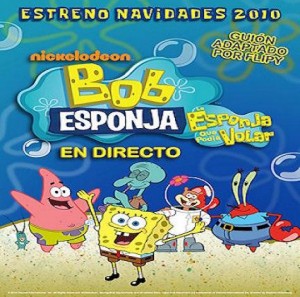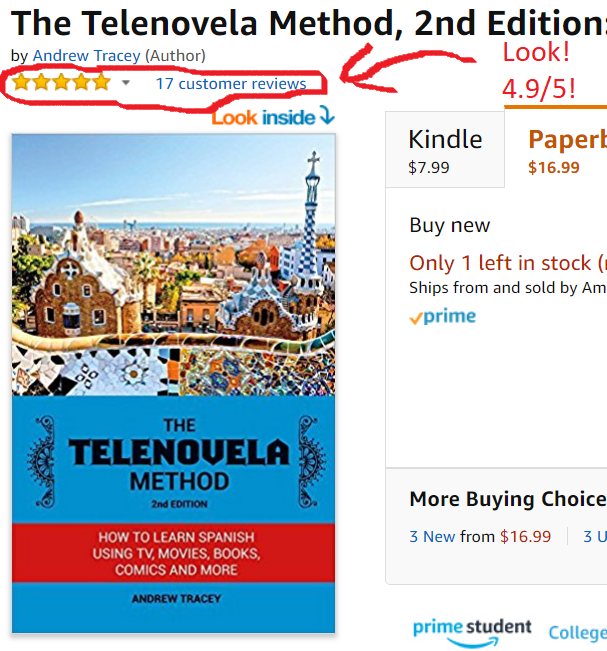 To put it a bit more accurately: because learning material designed to teach small children a language is specifically designed for people who have only a very basic grasp of the language, require that the material in question be fun and interesting (kids have short attention spans, adults frequently aren’t much better) and who need to remember it thereby necessitating the use of simple and common language taught in such a way that they will learn and remember it, in other words it’s perfect for beginning adult language learners. That’s why.
To put it a bit more accurately: because learning material designed to teach small children a language is specifically designed for people who have only a very basic grasp of the language, require that the material in question be fun and interesting (kids have short attention spans, adults frequently aren’t much better) and who need to remember it thereby necessitating the use of simple and common language taught in such a way that they will learn and remember it, in other words it’s perfect for beginning adult language learners. That’s why.
Allow me to expand on that.
You are a simpleton
Of course you are. Well, in terms of learning this new language you are (I’m presuming you’re a beginner here). You have, at best, a very basic grasp of the language: you know some basic grammar, you know a few hundred words at the very most, and you’re not particularly good at putting them together or pronouncing them and you need more time to think of what to say and to figure out what was said to you than an adult native speaker does. You’re a simpleton, you’re just like a small child trying to learn their native language, in other words. What works for them is what will work for you partially because it was specifically designed for somebody with a very limited, basic vocabulary and a very rudimentary grasp of the grammar and syntax of the language.
It must be fun and entertaining lest you lose interest
If it’s not fun, I want nothing to do with it–yes, I said “I”, I’m not just picking on you here. I’m the same way, and I’ve learned that the hard way over the years. The best way to do this is to make it as fun and entertaining as possible for yourself instead of trying to fight it and beat yourself into submission with discipline and boring textbooks and lessons and whatnot.
Yes, you, unlike a 3-year-old, can force yourself to concentrate on something horribly dull and boring, and to learn it, for 30 or 60 minutes at a time or even longer if it’s absolutely necessary. And you can do it tomorrow. And the next day. But for how long, ultimately? Let me save you the trouble: not long. In the long run, you’ll lose. You’ll quit after a few weeks or months and say “well, I guess I just can’t learn languages, you have to be a kid for that or born with the right gene or blah blah blah whatever”. Don’t do this, just make it fun and require as many of your learning materials as possible be fun as well. I understand that sometimes some of them must not be–occasionally you just need to read a grammar book or memorize some vocabulary or whatever and you can’t make it fun–it happens, just do your best, the majority of your learning material should be fun and interesting.
You know what kind of material designed to teach language is fun and interesting 100% of the time? Kids’ stuff. How could you not be amused by trying to understand the Spanish version of Sesame Street if you were just starting to learn Spanish? How could sitting there and trying to decipher what Big Bird or the Cookie Monster are saying as they’re saying it in Spanish not be fun? Of course that would be fun! So do it!
Kids’ stuff is designed to teach them the most basic, commonly used, necessary language, that grammar and vocabulary that they are the most likely to need to use–things like “arm”, “go” (and how to conjugate and use it), “car”, “mom”, “help”, how to say they want to go somewhere or simple manners and greetings, etc. You know who else needs to learn this sort of stuff? Hhhhmmmm?
That’s right, you. You’re a beginner in the language, so you don’t know how to say things like “arm” or “go” or “road”, and you definitely need to know these things, you need to learn the most common, useful, and essential elements of that language, and that’s precisely what these programs and books and such are designed to teach and they’re designed to do it in such a way that what they teach is memorable and therefore easily learned after only one or two viewings or readings. For example they use goofy animated characters who point to the objects they’re teaching you the word for as they say that word, e.g. a giant animated talking monkey points to its hand and says “mano” while swinging from a tree in front of a school: you think you’re going to forget that the word for hand in Spanish is “mano” anytime soon after watching that? Exactly 😉
One of my favorite sayings that I love using: “If it works but it’s stupid, then guess what: it’s not stupid.” If it works, use it. This works. So use it.
I learned to speak conversational Spanish in six months using TV shows, movies, and even comics: I then wrote a book on how you can, too
I have a whole method and a book I wrote about it called The Telenovela Method where I teach you how to learn Spanish from popular media like TV shows, movies, music, books, etc. that you can all find online for free. It was the #1 new release in the Spanish Language Instruction section on Amazon for nearly a month after it came out and currently has 17 reviews there with a 4.9/5 stars average. It's available for $7.99-$9.99 for the e-book version depending on who you buy it from (Kindle version on Amazon is now $7.99) and $16.99 for the paperback (occasionally a bit cheaper, again, depending on who you buy it from).
It's currently available in both e-book and paperback from:
Cheers,
Andrew







